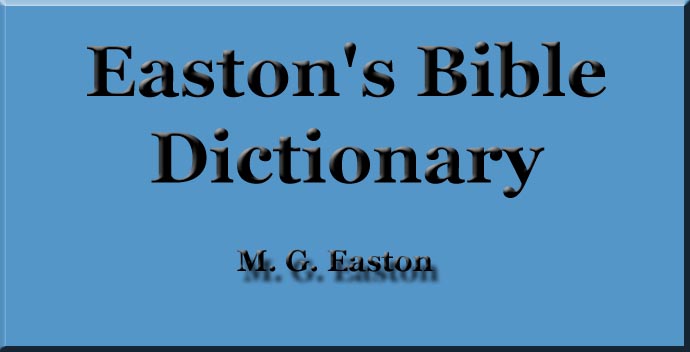

Bezek Lightning. (1.) The residence of Adoni-bezek, in the lot of Judah (Jdg 1:5). It was in the mountains, not far from Jerusalem. Probably the modern Bezkah, 6 miles south-east of Lydda. (2.) The place where Saul numbered the forces of Israel and Judah (Sa1 11:8); somewhere in the centre of the country, near the Jordan valley. Probably the modern Ibzik, 13 miles north-east of Shechem.
Bezer Ore of gold or silver. (1.) A city of the Reubenites; one of the three cities of refuge on the east of Jordan (Deu 4:43; Jos 20:8). It has been identified with the modern ruined village of Burazin, some 12 miles north of Heshbon; also with Kasur-el-Besheir, 2 miles south-west of Dibon. (2.) A descendant of Asher (Ch1 7:37).
Bible The English form of the Greek name Biblia , meaning "books," the name which in the fifth century began to be given to the entire collection of sacred books, the "Library of Divine Revelation." The name Bible was adopted by Wickliffe, and came gradually into use in our English language. The Bible consists of sixty-six different books, composed by many different writers, in three different languages, under different circumstances; writers of almost every social rank, statesmen and peasants, kings, herdsmen, fishermen, priests, tax-gatherers, tentmakers; educated and uneducated, Jews and Gentiles; most of them unknown to each other, and writing at various periods during the space of about 1600 years: and yet, after all, it is only one book dealing with only one subject in its numberless aspects and relations, the subject of man's redemption. It is divided into the Old Testament, containing thirty-nine books, and the New Testament, containing twenty-seven books. The names given to the Old in the writings of the New are "the scriptures" (Mat 21:42), "scripture" (Pe2 1:20), "the holy scriptures" (Rom 1:2), "the law" (Joh 12:34), "the law of Moses, the prophets, and the psalms" (Luk 24:44), "the law and the prophets" (Mat 5:17), "the old covenant" (Co2 3:14, R.V.). There is a break of 400 years between the Old Testament and the New. (See APOCRYPHA.) The Old Testament is divided into three parts: (1.) The Law (Torah), consisting of the Pentateuch, or five books of Moses. (2.) The Prophets, consisting of (a.) the former, namely, Joshua, Judges, the Books of Samuel, and the Books of Kings; (b.) the latter, namely, the greater prophets, Isaiah, Jeremiah, and Ezekiel, and the twelve minor prophets. (3.)The Hagiographa, or holy writings, including the rest of the books. These were ranked in three divisions:, (a.) The Psalms, Proverbs, and Job, distinguished by the Hebrew name, a word formed of the initial letters of these books, emeth, meaning truth. (b.) Canticles, Ruth, Lamentations, Ecclesiastes, and Esther, called the five rolls, as being written for the synagogue use on five separate rolls. (c.) Daniel, Ezra, Nehemiah, and 1 and 2 Chronicles. Between the Old and the New Testament no addition was made to the revelation God had already given. The period of New Testament revelation, extending over a century, began with the appearance of John the Baptist. The New Testament consists of (1.) the historical books, viz., the Gospels, and the Acts of the Apostles; (2.) the Epistles; and (3.) the book of prophecy, the Revelation. The division of the Bible into chapters and verses is altogether of human invention, designed to facilitate reference to it. The ancient Jews divided the Old Testament into certain sections for use in the synagogue service, and then at a later period, in the ninth century A.D., into verses. Our modern system of chapters for all the books of the Bible was introduced by Cardinal Hugo about the middle of the thirteenth century (he died 1263). The system of verses for the New Testament was introduced by Stephens in 1551, and generally adopted, although neither Tyndale's nor Coverdale's English translation of the Bible has verses. The division is not always wisely made, yet it is very useful. (See VERSIONS.)
Bier The frame on which dead bodies were conveyed to the grave (Luk 7:14).
Bigtha Garden, or gift of fortune, one of the seven eunuchs or chamberlains who had charge of the harem of Ahasuerus (Est 1:10).
Bigthan One of the eunuchs who "kept the door" in the court of Ahasuerus. With Teresh he conspired against the king's life. Mordecai detected the conspiracy, and the culprits were hanged (Est 2:21; Est 6:1).
Bildad Son of contention, one of Job's friends. He is called "the Shuhite," probably as belonging to Shuah, a district in Arabia, in which Shuah, the sixth son of Abraham by Keturah, settled (Gen 25:2). He took part in each of the three controversies into which Job's friends entered with him (Job 8:1; Job 18:1; Job 25:1), and delivered three speeches, very severe and stern in their tone, although less violent than those of Zophar, but more so than those of Eliphaz.
Bilgah Cheerful. (1.)The head of the fifteenth sacerdotal course for the temple service (Ch1 24:14). (2.) A priest who returned from Babylon with Zerubbabel (Neh 12:5, Neh 12:18).
Bilhah Faltering; bashful, Rachel's handmaid, whom she gave to Jacob (Gen 29:29). She was the mother of Dan and Naphtali (Gen 30:3). Reuben was cursed by his father for committing adultery with her (Gen 35:22; Gen 49:4). He was deprived of the birth-right, which was given to the sons of Joseph.
Bilshan Son of the tongue; i.e., "eloquent", a man of some note who returned from the Captivity with Zerubbabel (Ezr 2:2; Neh 7:7).